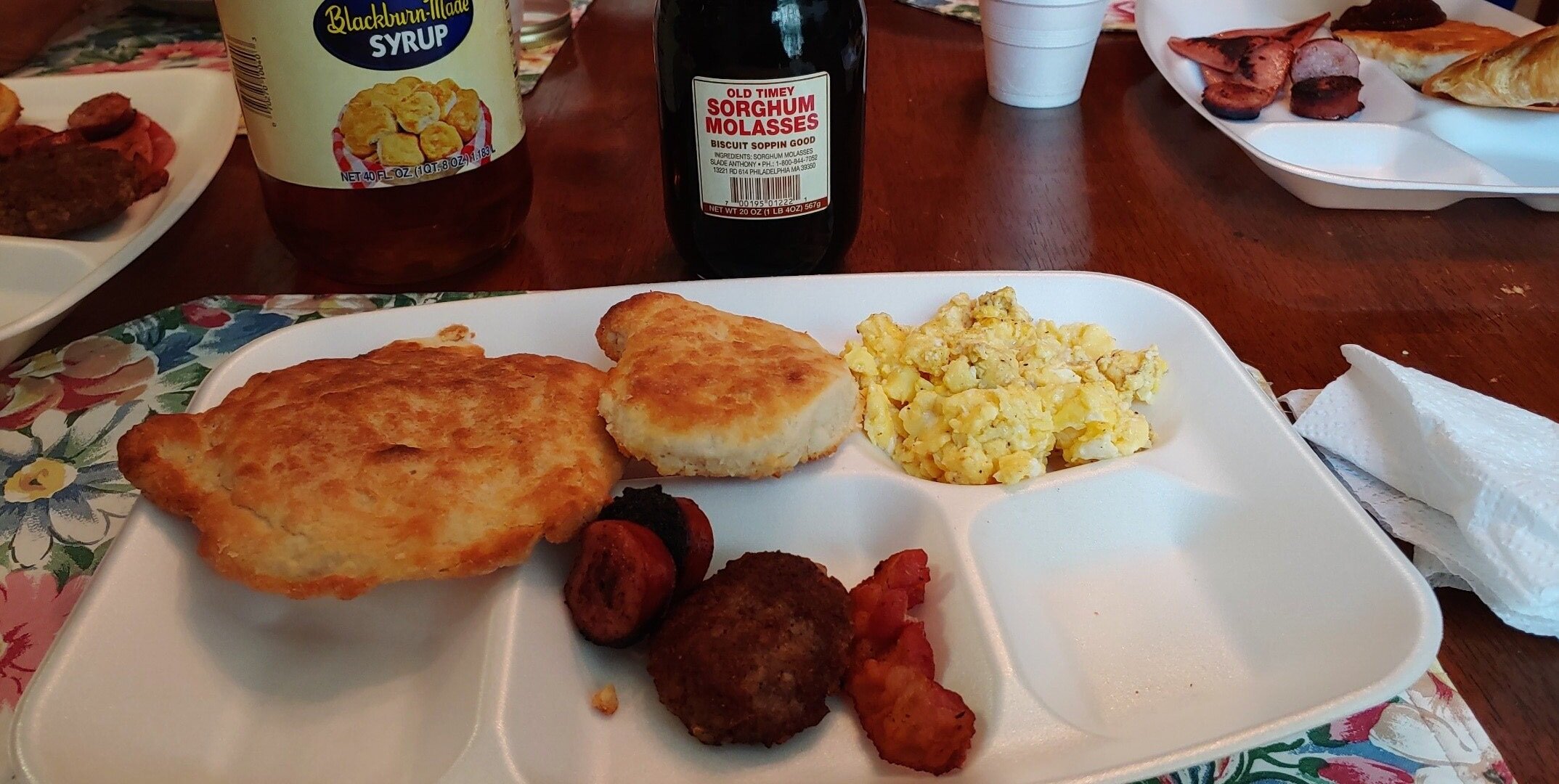Soul Food as a Black Soul-Practice
“Soul Food” is a term that sprang from the Black power movements of the ‘60s and ‘70s. The term signaled an Afro-Diasporic attempt to forge an “authentic” Black cuisine (though soul food is certainly a fusion of African, Indigenous American, and European cultures and reflects a synthesizing of cultures that became inevitable with the Trans-Atlantic slave trade). While there are scholars who differentiate between traditional southern food and soul food, Laretta Henderson argues that “For [Black people], the difference between traditional southern food and soul food was not contained in the ingredients but in the body of the cook. Only blacks cooked soul food” (83). Preparing soul food is thus a Black ritual practice that relies heavily on one’s intuition, soulfulness, and ability to improvise.
My grandma never owned a cookbook. She didn’t use measuring cups to determine how much of an ingredient was needed. She was deeply proud of the fact that she never made canned biscuits for her children and when we, her grandchildren, asked to be taught how to make biscuits and gravy from scratch, my grandma would snap “it’s easy as 1-2-3, you gotta be plain dumb if you can’t throw a lil’ flour and water together.” For my grandma, then, cooking was instinctive and just plain common sense. You learned it through looking, feeling, and listening in the kitchen. You learned it from your mother or grandmother, from an elder before you. For my grandmother, cooking was also a selfless act.
For as long as I can remember, my grandma Shirley prepared holiday meals for our entire family—and our family is big as it is Southern. She would start cooking the night before and not finish until the next evening. In addition to slicing fresh cucumber and tomato from my Papa’s small garden, she simmered cabbage and turnip greens in pork broth, cooked pinto beans with fatback, and slow-cooked pot roasts with carrots, onion, and potatoes. “I really ain’t that good of a cook, y’all just like it because y’all love me,” my grandma would say. And maybe it’s true. We didn’t love eating at grandma’s just because of the food. We ate at grandma’s because it was a place to gather ourselves and remember who we were in the world. As Elizabeth Pérez argues in Religion in the Kitchen, “the seemingly trivial kinds of activities involved in ceremonial cooking turn out to be emotionally and somatically intricate sites in which individuals are socialized” (2).
Hence, I argue the preparation and sharing of soul food as a Black ritual practice that heavily shapes family dynamics. At our family gatherings, for instance, children ate in the garage or outside, adults ate at the kitchen table, and the elders ate in the dining room (because “children got no place in grown folks’ business”). The food was set up buffet style and the family lined up according to age. Elderly people first. Children last. Hierarchy. Order. Everything and everyone had a place in my grandma’s house and that place was deeply influenced by one’s age, gender, and cooking capabilities. As is the case for rituals, soul food also had a designated place and time in our family.
Soul food is not just about what you eat but about when you eat it, how, and why. In observance of New Year’s Day, my Black southern family consumes black-eyed peas for luck and turnip greens for financial prosperity. In my family, food is a way to usher in blessings and dispel misfortune. Soul food is way of living and ordering one’s life. It is cooked as a family, it is eaten as a family, and it is cleaned up as a family—and who does what depends on who you are and how old you are. My grandma took charge of the main staples like the pot roast and dressing, my aunties handled the sides, and the grandchildren cleaned the kitchen and took out trash.
Preparing and sharing soul food with my family thus socialized me to respect my elders, clean up after myself, and avoid wasting food (every gathering, my grandma threatened to put wasted food into our shoes and make us walk around with it). It also taught me that showing love and sharing food was one in the same and that food profoundly shapes how one conceives of themselves. As Henderson asserts, “adults teach children food ways that are often associated with their ethnic identity.” It is soul food that reminds me who I am.
Relocating to the Midwest made the Black ritual practice of cooking soul food all the more important to me. Like the women and men before me, I clean and boil bitter greens, I wash meat before I bake or fry it, I make biscuits from flour, milk, and Crisco. Maneuvering the kitchen as my ancestors did helps me conjure up the wisdom and traditional practices that have shaped who I am—who we are. I cook to conjure, I cook to sustain connection, I cook to protect tradition. Whenever I need to feel close to home, I call upon my ancestors through my work in the kitchen. So, if soul food indeed depends upon the Blackness of the cook, it must be considered a soul-practice unique to Afro-diasporic peoples.
— Jaye Similton
REFERENCES:
Henderson, Laretta. “‘Ebony Jr!" and ‘Soul Food’: The Construction of Middle-Class African American Identity through the Use of Traditional Southern Foodways.” MELUS, vol. 32, no. 4, 2007, pp. 81–97. JSTOR, www.jstor.org/stable/30029833. Accessed 4 Dec. 2020.
Perez, Elizabeth. Religion in the Kitchen: Cooking, Talking, and the Making of Black Atlantic Traditions.









